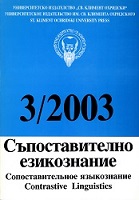Да хвърлех по отсрещния прозорец - глаголен вид и вреже при изразяване на хипотетична модалност в гръцки български и севернославянски
Да хвърлех no отсрещния прозорец - aspect and tense in the expression of hypothetical modality in Greek, Bulgarian and North Slavic
Author(s): Valentin GeshevSubject(s): Language studies, Theoretical Linguistics, Syntax, Philology
Published by: Софийски университет »Св. Климент Охридски«
Summary/Abstract: The imperfect (tense form) of (aspectually) perfective verbs was historically a relatively rare but nevertheless common Slavic phenomenon which finally developed further and was preserved only in Modern Bulgarian (including its spoken and/or written variants in the Republic of Macedonia, Eastern Serbia etc.) and partially in Literary Serbian. When its meaning is not iterative it is always modal (expressing imaginary, desirable, expected, plausible actions or states) which is in compliance with the Balkan linguistic context. Its Greek counterpart is the modal imperfect participating in the so called Modern Greek syntactic moods and able (despite of the continuous or iterative invariant meaning of the Greek imperfect) to express momentary or resultative (and not iterative!) actions or states. In Polish, as a representative of Northern Slavic, in such cases the conditional form of a perfective verb is used. So a correspondence can be observed which is a part of the general tendency that in the simple past tenses (where Bulgarian, unlike Modern Greek or Modern Northern Slavic, can combine aorist and perfect tense endings with both perfective or imperfective verbal stems) the Bulgarian verbs should coincide in aspect with the Northern Slavic ones but in tense with the Greek ones. If so it becomes obvious that in the past tenses the meaning of the Modern Greek verbal stem is more temporal and modal and less aspectual while in the future tense, in the imperative and in the Modern Greek constructions with na (corresponding to the Modern Bulgarian constructions with da or to the infinitive and subjunctive forms in other languages) the meaning of the Modern Greek verbal stem is predominantly aspectual and it is in this case that Modern Bulgarian, Modern Greek and Modern Northern Slavic perform a considerable aspectual symmetry.
Journal: Съпоставително езикознание / Сопоставительное языкознание
- Issue Year: 2003
- Issue No: 3
- Page Range: 36-46
- Page Count: 11
- Language: Bulgarian
- Content File-PDF

